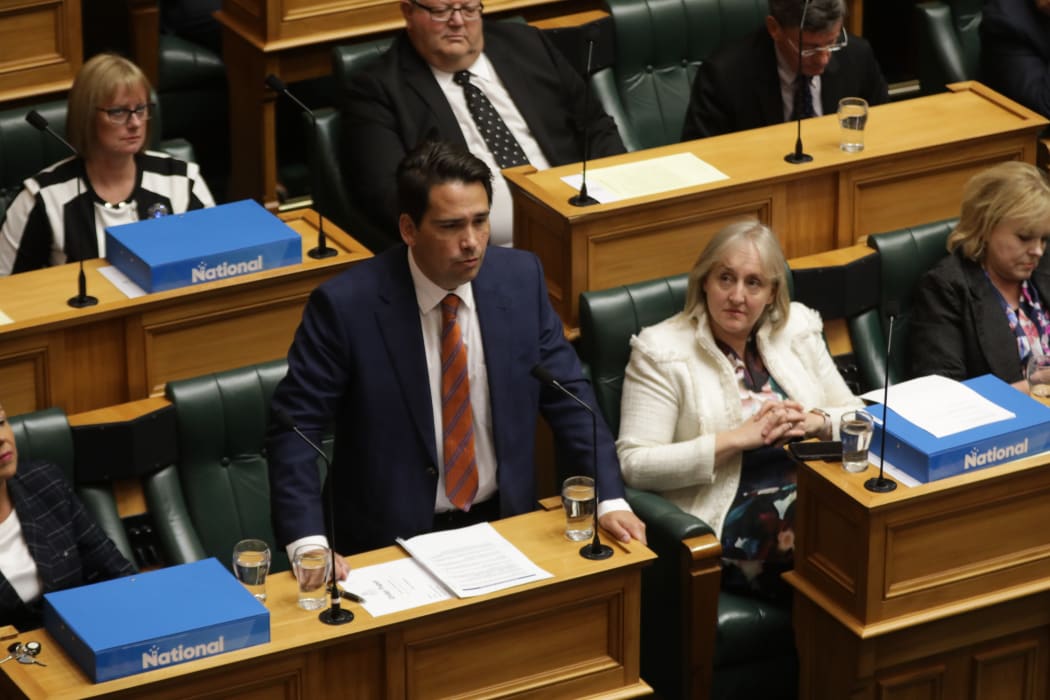Wednesdays are different at Parliament. That’s true this week too, but not in the usual way.
The theme this whole week is something like ‘If you’re still keen, let’s get busy.’ Wednesday splits its time between the halves of that statement.
The First Half: Question Time 2pm
What
-
Twelve Questions are posed to ministers with inquisitorial follow-ups (supplementary questions). Roughly two thirds of them are asked by the Opposition. It’s an hour of high drama, semantic-linguistic chess and squabbles over the rules. And shouting. The first of the year is usually intense.

Today sees the first batch of Oral Questions for the year Photo: RNZ / Rebekah Parsons-King
The Second Half: Debate on the PM’s Statement 3pm-ish
What
-
The House will continue a debate on the Prime Minister’s Statement. It’s a check that the Legislature is still on board with the Government’s plan. If they vote no, the Government falls. The debate on the Prime Minister’s Statement will continue daily into next week, but only until the dinner break.
-
The General Debate that usually happens on Wednesdays is deferred until after the debate on the Prime Minister’s Statement, which is also a very general debate, is finished.
The Third Half: Legislation 7:30pm
-
After dinner the House kicks into the second half of ‘If you’re still keen, let’s get busy,’ with debates on legislation. The next three bills on the order paper are all up to their committee stages (which can a little time or a lot), so it’s not easy to say how far they will get.
The Order Paper lists what MPs will debate but it can change. Here is an estimate of what they’ll try to work through.
Registering social workers
What:
-
The committee stage of the Social Workers Registration Legislation Bill
-
Will require all social workers to register with the Social Workers Registration Board.
-
Will also clarify the definition of a social worker.
Who:
-
The bill is in the name of the Minister for Social Development Carmel Sepuloni. It was first introduced under the previous National-led Government by the former Minister for Social Development, Anne Tolley. So you can expect general agreement.
MP says what?
-
At its first reading Anne Tolley said “because of this bill, any person or family working with a social worker will know that the social worker has been vetted by the police, is subject to professional ethics, and that they are a professional who undertakes annual development as a condition of their registration.”

"Oops" Photo: creative commons - pixabay - Free-Photos
God forfend, and gadzooks!
What:
-
The committee stage of the Crimes Amendment Bill which does a few things:
-
Repeals the law of “blasphemous libel” which is listed as an offence under the Crimes Act 1961, under the heading 'Crime against religion'.
-
Repeals the ‘year and a day’ law or Section 162 of the Crimes Act.
-
Repeals Section 71(2) of the Act which deals with spouses or civil union partners being charged as an accessory after the fact.
-
There’s a move planned to add in a current Member’s Bill (Ian McKelvie’s on rustling) to this bill.
Why:
-
Imprisonment for up to a year remains possible under current law for anyone who publishes any ‘blasphemous libel’ which can include worshiping Satan, or saying that God is cruel or unkind. While the clause is widely seen as anachronistic, removing it was the subject of most of the submissions on this bill. Yes you can read the written submissions on a bill online.
-
The ‘year and a day’ law prevents people being charged for causing someone's death if they died more than 'one year and a day' after the criminal act. The law has prevented charges in recent years including in relation to the collapse of the CTV building in the 2011 Christchurch earthquake which killed 115 people.
-
If someone helps a person who has committed a crime you can be charged with accessory after the fact unless you are that person’s spouse or civil union partner. This bill will get rid of that protection for spouses or partners.
ACC changes
What:
-
The committee stage of the Accident Compensation Amendment Bill
-
Describes itself as tidying up inconsistencies between different pieces of legislation and keep the regulatory system up to date and relevant.
-
The Bill will make a several changes including allowing surviving spouses to receive up to 5 years of weekly compensation, regardless of age and disestablishing the Accident Compensation Appeal Authority, which hears cases under the 1972 and 1982 Accident Compensation legislation.



